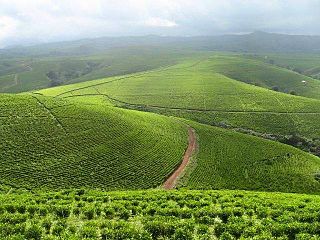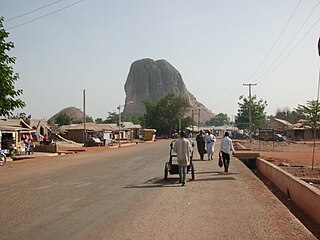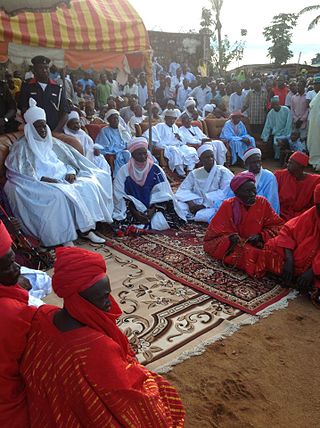History

In 1817, Muri was founded as a Fulbe jihad state. [3] From the death of the founder of Muri, Hamman Ruwa, in 1833 to 1880, the emirate went through a period of "extreme" disunity. [4] Some districts within the Emirate, like Gassol and Wurio, operated independently under princes of the central dynasty. It was only during the reign of Emir Abubakar dan Hamman Ruwa that a central government was able to operate throughout the Emirate. [4] The Emirate was also engaged in constant battle with the Jukun Chiefdoms, particularly in Kona. Not long after Emir Abubakar death in 1896, the districts of Gassol and Wurio once again revolted against the Emirate, heavily defeating its army which was commanded by Hassan (soon to be Emir). A year later, rebels from the two districts were joined by the Emir's younger brother, Muhammadu Mapindi, as he felt the new Emir was not adequately catering for his many younger siblings. The Emirate's army was able to regroup and repel the rebels who were fast approaching Jalingo, its capital. [5]
The Royal Niger Company had established a settlement, Ibi, within the Emirate since 1883. In 1884, 1888 and 1891 it sacked and burnt the town of Jibu. The comparatively weak Emirate was able to successfully apply a military sanction against the Company at Kunini and Lau in 1889. Lieutenant Antoine Mizon helped the Company conquer Kona in 1892. The company also sacked the towns of Wurio and Suntai in 1897 and 1899. In 1901, the Emirate, under Emir Hassan, submitted peacefully to the British. [5]

From 1892 to 1893 it was a de facto French protectorate, under Governor Louis Mizon (b. 1853 – d. 1899).

In 1901 it became a 25,800 m2. province of the British protectorate of Northern Nigeria, bordered S. by Southern Nigeria, SE. by German Cameroon, E. by the province of Yola, N. by Bauchi, W. by Nasarawa and Bassa with an estimated population of about 828,000. The district of Katsena-Allah extends south of the Benue considerably west of 9° E., the approximate limit of the remainder of the province. The province is rich in forest products, and the Niger Company maintained trading stations on the river. Cotton is grown, and spinning thread, weaving and dyeing afford occupation to many thousands. Muri province included the ancient Jukun empire together with various small Fula states and a number of pagan tribes, among whom the Munshi, who extended into the provinces of Nassarawa and Bassa, were among the most turbulent. The Munshi occupy about 4000 m2. in the Katsena-Alah district. The pagan tribes in the north of the province were lawless cannibals who by constant outrages and murders of traders long rendered the mail trade route to Bauchi unsafe, and cut off the markets of the Benue valley and the Cameroon from the Hausa states. Only two routes, one via Wase and the other via Gatari, passed through this belt. In the south of the province a similar belt of hostile pagans closed the access to the Cameroon except by two routes, Takum and Beli. For Hausa traders to cross the Muri province was a work of such danger and expense that before the advent of British administration the attempt was seldom made. [1]
Muri came nominally under British control in 1900. The principal effort of the administration has been to control and open the trade routes. In 1904 an expedition against the northern cannibals resulted in the capture of their principal fortresses and the settlement and opening to trade of a large district, the various routes to the Benue being rendered safe. In 1905 an expedition against the Munshi, rendered necessary by an unprovoked attack on the Niger Company's station at Abinsi, had a good effect in reducing the riverain portion of this tribe to submission. The absence of any central native authority delayed the process of bringing the province under administrative control. Its government was organized on the same system as the rest of Northern Nigeria, and under a British Resident. It was divided into three administrative divisions -east, central and west- with their respective headquarters at Lau, Amar and Ibi. Provincial and native courts of justice were established. The telegraph was carried to the town of Muri. Muri is one of the provinces in which the slave trade was most active, and its position between German territory and the Hausa states rendered it in the early days of the British administration a favorite route for the smuggling of slaves. [1]










